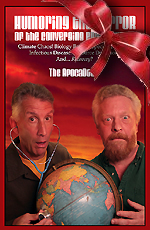SEARCH
A great gift
for crisis deniers!

Humoring the Horror of the
Converging Emergencies
94 color pages
$24.99 now $15!
Or read FREE online!

Twitter

Ping this story
in social media:
del.icio.us
Digg
Newsvine
NowPublic
Reddit
Facebook
StumbleUpon
|
 |
|
 |
|
 |
|
 |
|
Idaho trout face climate trouble, study finds http://apocadocs.com/s.pl?1313590202
"Fundamentally, skepticism is a good thing in science," said Wenger, a fisheries researcher with Trout Unlimited in Boise.
Both Wenger and Isaak, a fisheries biologist at the U.S. Forest Service's Rocky Mountain Research Station in Boise, were a part of a team of 11 scientists who said trout habitat could drop by 50 percent over the next 70 years because of a warming world. The paper, published Monday in the peer-reviewed science journal Proceedings of the National Academy of Sciences, predicts native cutthroat habitat could decline by 58 percent.
The two men, who have devoted their lives to scientific research, say they depend on the scientific method and peer review to judge the quality of the research that underscores their findings. The climate predictions are based on 10 of the 20 climate models developed independently worldwide that all show the world is getting warmer.
"The climate models have been right for 30 years and they are getting better all the time," Isaak said.
The data these men have collected in the watersheds of the West shows the same trends, they said. And warmer water isn't the only problem.
The research also shows that warmer winters are causing more winter floods that wash away the gravel that holds brook and brown trout eggs.
The changing spring and summer flows give rainbow trout an advantage over native cutthroat trout in the rivers they share, allowing the invaders to crowd out the natives. And the forecast for the future is more unnerving to these researchers and anglers than even they want to believe.
The most dire climate models show temperatures in Idaho rising an average of 9 degrees in 70 years, Wenger said. "That would make Boise pretty unpleasant," he said. "None of us want to believe that."
But Wenger is a scientist. He may hope the models that predict only a 4- to 5-degree rise over 70 years are more accurate, but he has to use the science that is available.
"I have to set aside my feelings and use the best data," he said.
|
|
 |
|
 |
|
 |
[Read more stories about:
invasive species, koyaanisqatsi, ecosystem interrelationships]
|
 |
|
New!:
| |
|
No reader quips yet -- be the first! | |
|
Got a PaniQuip?
|
|
|
We reserve the
right to reuse, remove, or refuse any entry.
| |
|
 |
'Doc Jim says:
|
 |
 |
 |
If, of course, you believe in so-called "evidence."
|
|
|
|
 |
Want to explore more?
Try the PaniCloud!
|










